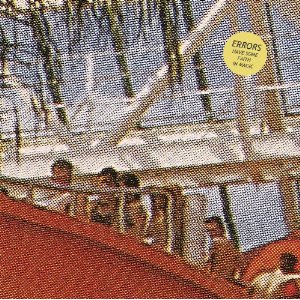The official line on Errors’ third album is that the Glaswegian quartet have shed the ‘post-rock’ label and have made an unabashed pop album, rich in melody and making extensive use of vocals for the first time. Vocals, of course, are more important in a pop record than in a ‘post-rock’ one; the pop fan likes to have something to sing along with, likes a memorable phrase for a hookline, and even likes to have a vague idea of what a song is about (love, sex and dancing, preferably). So is this a new, accessible, easy-to-digest Errors we see before us? Well, everything is relative and nothing more so than the nebulous concept of ‘pop.’ "We intended the vocals to be used as another instrument" Errors’ Steev Livingstone has said, which is something post-rockers have been saying for the past twenty years, when they can be bothered to use vocals at all. To my knowledge, it is not a phrase that has ever been uttered by Girls Aloud.
Once we’re clear about what to expect however, Have Some Faith in Magic is not a difficult album to love. ‘Tusk’ – not the Fleetwood Mac song, but benefiting from the subconscious association – shimmers lightly in before exploding into 1980s disco pomp, with guitars of glass and sugar balancing on a coke-stained razor’s edge between teeth-grinding and ecstatic, romping over a fishnet mesh of dazzling synth spirals. It sounds like an overture; it sounds like eagles flying over mountain castles of glitter and Perspex. ‘Magna Carta’, which you may have already heard, is Bowie’s Low casting off its existential gloom and heading out for a night on the town- c’mon Iggy, Brian, Wolfgang, Rolf, chop out a few fat ones and let’s party! Though this features vocals, it’s no more a vocal track than anything off the aforementioned Bowie album’s infamous "instrumental side", a more upbeat reiteration of the wordless chanting of ‘Warsawa’ or ‘Weeping Wall.’ Glimmering seductively at first around a four-to-the-floor bass drum, it soon becomes messier and lairier, all groping hands and tongues in ears as Sister Midnight makes a grab for Harry Lime’s zither.
‘Blank Media’ is gentler, elegiac; echoing Memory Tapes’ stoned, neurologically-damaged approximation of 80s alt-pop. In my head it plays to juddering Super 8 footage of California girls and teen dream hot rods before the oil ran out and the weather went crazy, the film all burns and scratches, bleached out, blonde hair, perfect teeth in a close-up smile, the knowledge that they died somehow, soon after, maybe; when, how, unsure. "We slide down the surface of things" wrote Bret Easton Ellis in Glamorama, and ‘Pleasure Palaces’ is less post-rock, more post-disco, clinging to the beat like handholds in glass. It also reminds me acutely of classic, mid-period New Order. Similarly, ‘Cloud Chamber’ sounds like a requiem mass for New York’s Paradise Garage, the ghosts of Larry Levan and Bobby O flickering through the chants and the smoke. Graced with function as well as form (i.e. you can dance to them), these are the album’s high points.
Elsewhere, the busy fusion of Sylvester Levay’s Airwolf theme with Gregorian chanting and polished afro-funk on ‘Earthscore’ may suggest a cathedral full of shiny black, mysteriously sentient and heavily-armed helicopters, but the spare, short, ‘Canon’ is incidental music for a stylish 1970s German spy thriller. Less successful is ‘The Knock,’ which staggers about aimlessly, bouncing off the walls; dressed up very smartly in all the latest fashions, to be sure, but mumbling incoherently when asked just exactly what it thinks it’s doing. Indeed, although it’s often enormously affecting, the sugar-and steel, candy-floss consistency of this album eventually becomes cloying and overblown. The would-be anthemic closer, ‘Holus Bolus’ wades deep in chillwave clichés: the sparkling, burbling synth lines and keening bagpipe guitars, the processed beats and scout-troupe in space vocal harmonies without a speck of grit or soul, a germ free adolescence so clean it’s like staring into an empty mirror.
Ultimately, Have Some Faith in Magic is very pretty and very meaningless, despite my vain critical attempts to find significant undercurrents in its sounds, as though moments of beauty and energy have to be justified and driven by some inherent truth or emotional backstory. I’m probably reading too much into the album’s title too if I suggest that, by using the words ‘faith’ and ‘magic,’ Errors are admitting to working in an area where the absence of rational cause and effect and any grounding in objective reality are put forward as positive qualities, actually contributing towards the wonder and romance with which their impossible marvels are received. Their fans, I suspect, neither want nor need spurious critical interpretations of their dazzling conceits. In this age of overabundance, it may seem like it doesn’t matter if nothing is built to last; relish the childlike joy of the rushing moment and the narcotic hit of contrived, false nostalgia, then move on. Why try to weigh something as gorgeously ungraspable as this album down with lumbering substance? Because it’s the ballast that stops it floating away into the ether, I say. It doesn’t matter if it’s pop or experimental, vocal or instrumental; only that surface, however glittering, is no substitute for depth. Have some faith in magic, Errors reply. Look, we can fly! Who cares where we come down?



